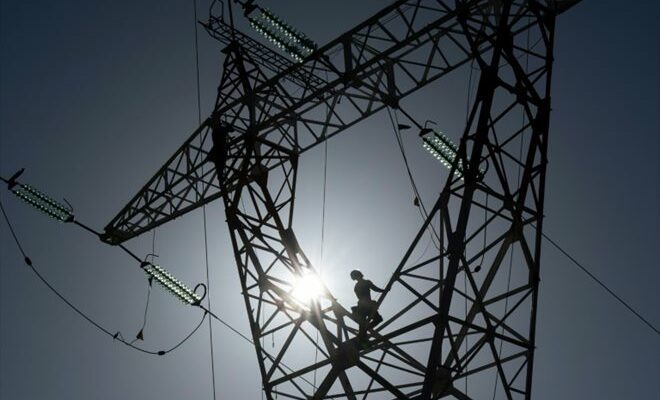At the turn of 2023, France once again became a net exporter of electricity, RTE, the manager of the high and very high voltage electricity network, said on Tuesday (AFP/Archives/JEFF PACHOUD)
For the first time in months, France became a net electricity exporter again at the turn of 2023, thanks to a mild winter, good wind production and EDF’s efforts to reconnect reactors nuclear.
“Since January 1, the net balance of electricity exports has amounted to 1.4 terawatt hours (TWh),” the manager of the high and very high voltage network, RTE, told AFP on Tuesday. This balance is equivalent to the power consumed over one year by 450,000 households.
The “recovery” of nuclear production, the mild winter which avoids pushing the heating and favorable winds for wind production mean that France is starting to export more electricity to its European neighbors than it imports, at the less temporarily. “We have the impression that we have changed the world,” summarized Nicolas Goldberg, energy expert at Colombus Consulting, to AFP.
“Extremely low consumption, wind turbines which produce at full capacity and nuclear power which produces within the average forecast by RTE, all this means that we are a net exporter of electricity and that no one is talking about power cuts anymore, explains- he.
At a time when parliamentarians are examining a bill to accelerate the development of renewable energies and catch up with a crying delay compared to European neighbors, “wind energy is also showing that it provides a small service in winter”, notes Mr. Goldberg .
In detail, France has returned, according to RTE, with net exports from the first week of the Christmas holidays, i.e. the complete opposite of 2022.
With historically low nuclear production estimated in a range of 275-285 TWh in 2022, France had been a net importer of electricity for almost the whole of the year (except February, May and from the end of December), which which had not happened for 42 years.
Historically the leading electricity exporting country in Europe, France had to import it from Spain, Germany or the United Kingdom to avoid cuts.
– “To be careful” –
Last year, France was faced with an unprecedented lack of availability of the nuclear fleet due to scheduled, but prolonged, maintenance on reactors and the discovery at the end of 2021 of corrosion problems on portions of piping crucial for safety. power plants, requiring lengthy repairs. France could hardly rely either on its hydraulic stocks (dams), which suffered from the drought, even if they have since been partially replenished this autumn.
Under pressure from the government, EDF has worked hard to put 14 reactors back into service since November 1.
“The engineers, the workers, the employees of EDF have just restored today (on the network) the 45 gigawatts that they had promised for mid-January” (out of a total installed capacity of 61.4 GW ), welcomed Tuesday the Minister of the Economy Bruno Le Maire, in front of the deputies.
With 44 reactors reconnected out of 56, the nuclear fleet showed an availability of 73.7% on Monday, a level more reached since February 11, 2022 (74.8%), according to EDF figures analyzed by AFP.
The availability of the nuclear fleet should however “decrease again from February” 2023, noted RTE at the end of December, while six reactors will have to be shut down in 2023 for corrosion sites.
“You can be enthusiastic, but you have to be careful,” said Mr. Goldberg.
“All this can turn around quite quickly, if in February there is little wind and a cold snap”, warns the analyst. France will then have to draw on its gas stocks to produce electricity and would approach winter 2023-2024 with less margin.
In the meantime, the drop in electricity consumption is confirmed by the latest measurements published Tuesday evening by RTE. Last week, consumption fell by 8.9% compared to the average for previous years (2014-2019) over the same period, according to figures as of January 8, restated for calendar and weather effects.
A decline which is also maintained on the natural gas side: excluding electricity production from gas, French consumption fell by 16.6% between August 1 and January 8, according to GRTgaz.
© 2023 AFP
Did you like this article ? Share it with your friends with the buttons below.




